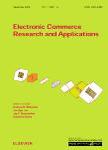版权所有:内蒙古大学图书馆 技术提供:维普资讯• 智图
内蒙古自治区呼和浩特市赛罕区大学西街235号 邮编: 010021

作者机构:Beijing Univ Technol Coll Econ & Management Res Base Beijing Modern Mfg Dev Beijing Peoples R China Stevens Inst Technol Sch Syst & Enterprises Hoboken NJ 07030 USA Japan Adv Inst Sci & Technol Sch Knowledge Sci 1-1 Ashahidai Nomi City Ishikawa 9231292 Japan
出 版 物:《ELECTRONIC COMMERCE RESEARCH AND APPLICATIONS》 (电子商务研究及应用)
年 卷 期:2021年第48卷
页 面:101064-101064页
核心收录:
学科分类:1202[管理学-工商管理] 08[工学] 0812[工学-计算机科学与技术(可授工学、理学学位)]
主 题:Recommender systems Deep learning User preference Recommendation algorithm Data sparsity Privacy protection
摘 要:The development of Internet comes up with the prosperity of E-commerce all over the world. In order to promote sales and save consumers labor in commodity browsing, recommender systems are proposed by E-commerce platforms to provide online consumers with products and services of their potential interests. The primary challenge in recommendation roots in the intricacy in quantifying users preferences on items with the reality of data sparsity and the computation complexity. Hence, more and more researchers are attempting deep learning techniques to deal with the challenge with the hope of using advanced algorithms to alleviate the intricacy. Word embedding is used to learn the association of items in a space of low dimensionality. Multi-layer perception is used to learn users preferences on items in a data-driven manner with a customized loss function. The future work of recommender systems includes three folds. The one is to make use of multi-source data to combine implicit and explicit user behavior data to address the problem of data sparsity. The second is dynamic recommendation with the changing users preferences on items and make recommender systems light-weight and useable in complex scenarios. The third is to provide effective and verifiable recommendation under the premise of user privacy protection